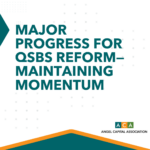Angel Insights Blog

Monday, May 11, 2015
Public Policy Isn’t Just a National Issue
By: Ken Kousky, BlueWater Angels and Krista Tuomi, American University
The Angel Capital Association has played an important role in shaping the most vital public policy issues that affect angel investment practices ranging from the implementation of the JOBS Act to the definition and verification of accredited investors. While meetings with the SEC and Members of Congress have been vital for ACA members, political actions at the state level are just as important.
The key state issues include tax credits for angel investments, matching co-investments by the state, grants and incentives to angel networks and even state-run venture and angel funds. Knowing what works remains a critical challenge at both the state and national level requiring that we organize and support our interests in both arenas.
The ongoing dissemination of economic studies will continually be reported in our blogs and hopefully serve as a vehicle to promote effective public policies that aid our startups in financing their businesses.
We start with a catalog of which states are running each of the programs. The next step is much harder – which programs are working. The nuances become important at this stage since there is variability between the states.
Angel groups would be well-served to take the time to avail themselves of the support programs in their state and assist lawmakers in better tuning their offerings. There is quite broad support in most states for improving the success rate of their start-ups but the legislators need input and guidance.
These will be ongoing themes for us to discuss.
Public Co-investment Funds? Boon or Burden?
‘Matching grants’ and public co-investment funding have long been part of governments’ toolkits – and American states can learn from the experience of other parts of the world. Many countries have instituted a form of matching grant and their popularity is currently rising in Europe. In the western hemisphere, a number of Canadian provinces and US states are also experimenting with co-investment programs.
On the face of it, this seems promising. Who would object to public money boosting the amount that angels can invest in start-ups? As with all public policy, however, results depend on the context, structure and effect of the program on incentives. In this blog, we briefly look at some “good” and some “teaching” examples.
What is “good practice” when it comes to matching grants? Generally one wants to avoid the trap that Brazil (and some argue parts of Europe) are falling into, where public funding crowds out private investors. It is far easier to tap public money with less downside for start-ups. BUT this prevents angel and VC mentorship benefits, and firms are dis-incentivized from growing rapidly.
An international model worth studying is the highly successful New Zealand Venture Investment Fund (NZVIF), a stand-alone company. The government distances itself from risk and the investment decisions made by managers. Its investments take the form of equity, with the option to buy out NZVIF at the end of five years on the basis of capital plus interest only. As with Israel’s Yozma program, investors receive the upside and the government is merely a co-investor with no interference and no special rights, according to Josh Lerner’s book Boulevard of Broken Dreams.
The new European Angels Fund also looks promising. Instead of granting co-investments on a deal-by-deal basis, EAF enters long-term contractual relationships with angels. These contracts are generally standardized but leave room for adaptation to the specific requirements of individual angels such as timeframe and sector focus. All investment decisions are taken by angels and their investments are matched on a pari passu basis. The EAF does not pay a fee to the angels but shares investment related costs on a pro-rata basis. This is too new to evaluate properly, but early results are encouraging.
What are some of the “more problematic” experiments? The US Small Business Investment Companies (SBIC) program had a number of early teething issues. For example, originally SBICs could not hold equity, only debt and convertible debt. They were also restricted in their ability to control the companies invested in, due to limitations on employee stock options. Moreover, for many years the program attracted some fairly inexperienced financiers. The Small Business Administration has made reforms over the years, but the problem of control over distributions can still be problematic. With the SBIC program, you are also limited in the amount of capital you can invest in any one company, and on how long you can hold capital. Angels and VCs generally prefer the flexibility to invest and pick winners, and to determine the best moment for a sale or IPO.
The Canadian Labor Fund Program is another “teaching example.” The program capped lending amounts, meaning it was too small to effectively make a difference. This was compounded by muddled mandates (for example, promoting local development) and costly reporting requirements for small business. Like the SBIC program, there were also tight requirements on holding capital, which similarly prevented waiting for the best investment opportunity.
The next blog will look at some of the continually expanding US state options. Hopefully the new programs will realize that all parties benefit when angels are allowed to make full use of their experience through flexible funding sources.
Tags: Economy







